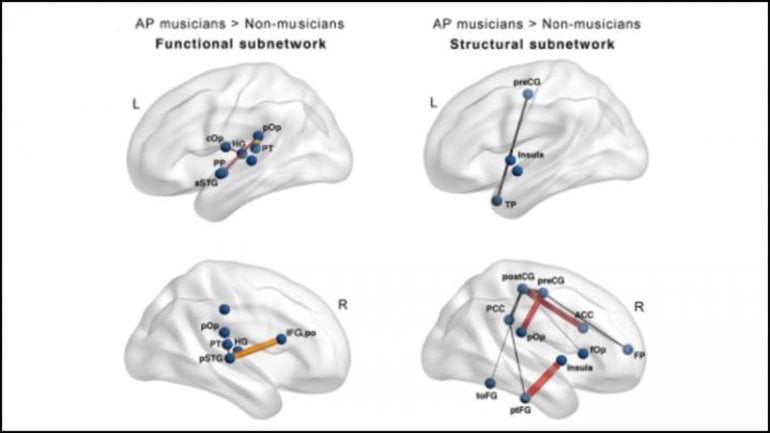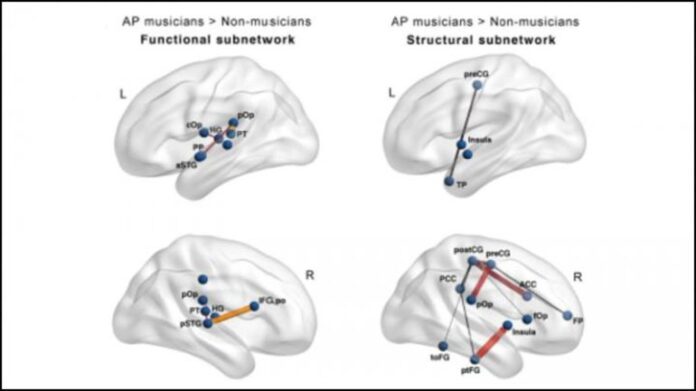[ad_1]
Summary: Regardless of innate pitch ability, musicians’ brains have stronger connections than those who don’t play music.
Source: SfN
The brains of musicians have stronger structural and functional connections compared to those of non-musicians, regardless of innate pitch ability, according to new research from Journal of Neuroscience.
Years of musical training shape the brain in dramatic ways. A minority of musicians — with Mozart and Michael Jackson in their ranks — also possess absolute pitch, the ability to identify a tone without a reference. But, it remains unclear how this ability impacts the brain.
In the biggest sample to date, Leipold et al. compared the brains of professional musicians, some with absolute pitch and some without, to non-musicians. To the team’s surprise, there were no strong differences between the brains of musicians with and without absolute pitch ability; instead absolute pitch may shape the brain in more subtle ways.

Compared to non-musicians, both types of musicians had stronger functional connectivity — the synchronized activity of brain regions — in the auditory regions of both brain hemispheres. Musicians also had stronger white matter connections between auditory regions and lobes involved in various types of high-level processing.
Musicians that began their training at a younger age had stronger structural connections than musicians with a later start.
These results demonstrate how experience shapes the brain, especially early in life, and how enhanced musical skills are represented in our brain.
About this neuroscience research news
Source: SfN
Contact: Calli McMurray – SfN
Image: The image is credited to Leipold et al., JNeurosci 2021
Original Research: Closed access.
“Musical Expertise Shapes Functional and Structural Brains Networks Independent of Absolute Pitch Ability” by Simon Leipold, Carina Klein and Lutz Jäncke. Journal of Neuroscience
Abstract
Musical Expertise Shapes Functional and Structural Brains Networks Independent of Absolute Pitch Ability
Professional musicians are a popular model for investigating experience-dependent plasticity in human large-scale brain networks. A minority of musicians possess absolute pitch, the ability to name a tone without reference. The study of absolute pitch musicians provides insights into how a very specific talent is reflected in brain networks. Previous studies of the effects of musicianship and absolute pitch on large-scale brain networks have yielded highly heterogeneous findings regarding the localization and direction of the effects. This heterogeneity was likely influenced by small samples and vastly different methodological approaches. Here, we conducted a comprehensive multimodal assessment of effects of musicianship and absolute pitch on intrinsic functional and structural connectivity using a variety of commonly employed and state-of-the-art multivariate methods in the largest sample to date (n = 153 female and male human participants; 52 absolute pitch musicians, 51 non-absolute pitch musicians, and 50 non-musicians). Our results show robust effects of musicianship in inter- and intrahemispheric connectivity in both structural and functional networks. Crucially, most of the effects were replicable in both musicians with and without absolute pitch when compared to non-musicians. However, we did not find evidence for an effect of absolute pitch on intrinsic functional or structural connectivity in our data: The two musician groups showed strikingly similar networks across all analyses. Our results suggest that long-term musical training is associated with robust changes in large-scale brain networks. The effects of absolute pitch on neural networks might be subtle, requiring very large samples or task-based experiments to be detected.
SIGNIFICANCE STATEMENT
A question that has fascinated neuroscientists, psychologists, and musicologists for a long time is how musicianship and absolute pitch, the rare talent to name a tone without reference, are reflected in large-scale networks of the human brain. Much is still unknown as previous studies have reported widely inconsistent results based on small samples. Here, we investigate the largest sample of musicians and non-musicians to date (n = 153) using a multitude of established and novel analysis methods. Results provide evidence for robust effects of musicianship on functional and structural networks that were replicable in two separate groups of musicians and independent of absolute pitch ability.
[ad_2]
Source link













